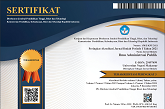Community Participation in The Implementation of Waste Management Policies In Surabaya Main Waste Bank
(1) Universitas Airlangga, Surabaya, Indonesia
(2) Universitas Airlangga, Surabaya, Indonesia
(3) Universitas Airlangga, Surabaya, Indonesia
(*) Corresponding Author
DOI: https://doi.org/10.26858/jiap.v12i2.42953
Abstract
The 2030 SDGs target will not be achieved as long as the environment is still polluted by wild waste. Wild waste is a problem that is closely related to households, where the city of Surabaya is free from the problem of illegal waste. Therefore, the participation of Surabaya City households in managing waste is the object of research. What drives households to participate in waste management activities, especially in BSIS, is discussed in this study. This research is a qualitative research with an interpretive social science approach. The research location was at BSIS where the data collection was obtained through literature, observation, documentation, and in-depth interviews with selected informants using a purposive technique. Checking the validity of the data used source triangulation and data analysis using qualitative data analysis techniques. The results of the study show that those who participate in BSIS are those who have economic motives or make BSIS a financial resource, have the skills to participate, carry out government commitments, adhere to the same social organization tradition, know the legal framework regarding waste banks, and have ease of accessing information.
Keywords
Full Text:
PDFReferences
Akhrif, O., Benfares, C., El Bouzekri El Idrissi, Y., & Hmina, N. (2020). Collaborative approaches in smart learning environment: A case study. Procedia Computer Science, 175, 710–715. https://doi.org/10.1016/j.procs.2020.07.105
Amusan, L., Akintaro, H., Osawaru, F., Makinde, A., Tunji-Olayeni, P., & Akomolafe, M. (2018). Information on state of challenges of waste management system in Nigeria urban housing system. International Journal of Mechanical and Production Engineering Research and Development (IJMPERD), 8(2), 75–86.
Atinga, R. A., Agyepong, I. A., & Esena, R. K. (2019). Willing but unable? Extending theory to investigate community capacity to participate in Ghana’s community-based health planning and service implementation. Evaluation and Program Planning, 72, 170–178. https://doi.org/https://doi.org/10.1016/j.evalprogplan.2018.10.001
Berejena Mhongera, P., & Lombard, A. (2020). Pathways of resilience for children facing socio-economic adversities: Experiences from Future Families’ OVC programmes in South Africa. Children and Youth Services Review, 108, 104657. https://doi.org/https://doi.org/10.1016/j.childyouth.2019.104657
Cheng, X., Zhong, W., & Li, D. (2021). Urban neighborhood self-governance and community attachment: Evidence from southwest China. Cities, 112, 103128. https://doi.org/https://doi.org/10.1016/j.cities.2021.103128
Craig, G., & Mayo, M. (1995). Community empowerment: A reader in participation and development. Zed Books.
Ferreira, R. (2017). Military involvement in post-conflict transformation in African Peace-Building. Journal of Military Studies, 45(1), 1–20.
Kumar, S. (2002). Methods for community participation: a complete guide for practitioners.
Li, J., Krishnamurthy, S., Pereira Roders, A., & van Wesemael, P. (2020). State-of-the-practice: Assessing community participation within Chinese cultural World Heritage properties. Habitat International, 96, 102107. https://doi.org/https://doi.org/10.1016/j.habitatint.2019.102107
Manzo, L. C., & Perkins, D. D. (2006). Finding common ground: The importance of place attachment to community participation and planning. CPL bibliography, 20(4), 335–350.
Mutero, I. T., Mindu, T., Cele, W., Manyangadze, T., & Chimbari, M. J. (2022). Engaging youth in stakeholder analysis for developing community‐based digital innovations for mental health of young people in Ingwavuma community, in KwaZulu‐Natal Province, South Africa. Health & Social Care in the Community. https://doi.org/10.1111/hsc.13817
Nugroho, R. (2017). Public Policy: Dinamika Kebijakan, Analisis Kebijakan, dan Manajemen Politik Kebijakan Publik. Jakarta: Elex Media Komputindo.
Rhodes, S., & Powers, J. (2021). Reimagining Training During a Pandemic: The Experience of Middle Tennessee GWEP. Innovation in Aging, 5(Suppl 1), 473–474. https://doi.org/10.1093/geroni/igab046.1833
Rohlinger, D. A., Olsen, A., & Hewitt, L. (2020). Dualing discourse: Democracy, gender equity and discursive politics in rural Morocco. Women’s Studies International Forum, 81, 102373. https://doi.org/https://doi.org/10.1016/j.wsif.2020.102373
Ufi, J. A., Rengifurwarin, Z. A., Madubun, J., Akib, H., & Muhammad, B. (2020a). A collaborative process model in managing kalrez csr program of clean water installation to the bula community in east seram regency, Maluku - Indonesia. International Journal of Scientific and Technology Research, 9(1), 842–850.
Ufi, J. A., Rengifurwarin, Z. A., Madubun, J., Akib, H., & Muhammad, B. (2020b). A collaborative process model in managing kalrez csr program of clean water installation to the bula community in east seram regency, Maluku - Indonesia. International Journal of Scientific and Technology Research, 9(1).
Wang, Y., & Fesenmaier, D. R. (2004). Towards understanding members’ general participation in and active contribution to an online travel community. Tourism management, 25(6), 709–722.
Yadav, L., Gill, T. K., Taylor, A., deYoung, J., Visvanathan, R., & Chehade, M. J. (2022). “Context, content, and system” supporting digital health hub (DHH)–enabled models of care (MoCs) for fragility hip fractures: perspectives of diverse multidisciplinary stakeholders in South Australia from qualitative in-depth interviews. Archives of Osteoporosis, 16(1), 167. https://doi.org/10.1007/s11657-021-01031-3
Zahra, K., Majeed, K., Mahmood, A., & Asad, M. (2012). Impact assessment of community participation in solid waste management projects in selected areas of Faisalabad City. J. Urban Plan. D, 138, 319–327.
Zakus, J. D. L., & Lysack, C. L. (1998). Revisiting community participation. Health policy and planning, 13(1), 1–12.
Article Metrics
Abstract view : 175 times | PDF view : 46 timesRefbacks
- There are currently no refbacks.
Copyright (c) 2023 Yuli Eka Fauziah, Bintoro Wardiyanto, Antun Mardiyanta

This work is licensed under a Creative Commons Attribution 4.0 International License.
Diterbitkan oleh:
Program Studi Ilmu Administrasi Publik
Program Pascasarjana Universitas Negeri Makassar
JIAP Index By:

This work is licensed under a Creative Commons Attribution 4.0 International License.









